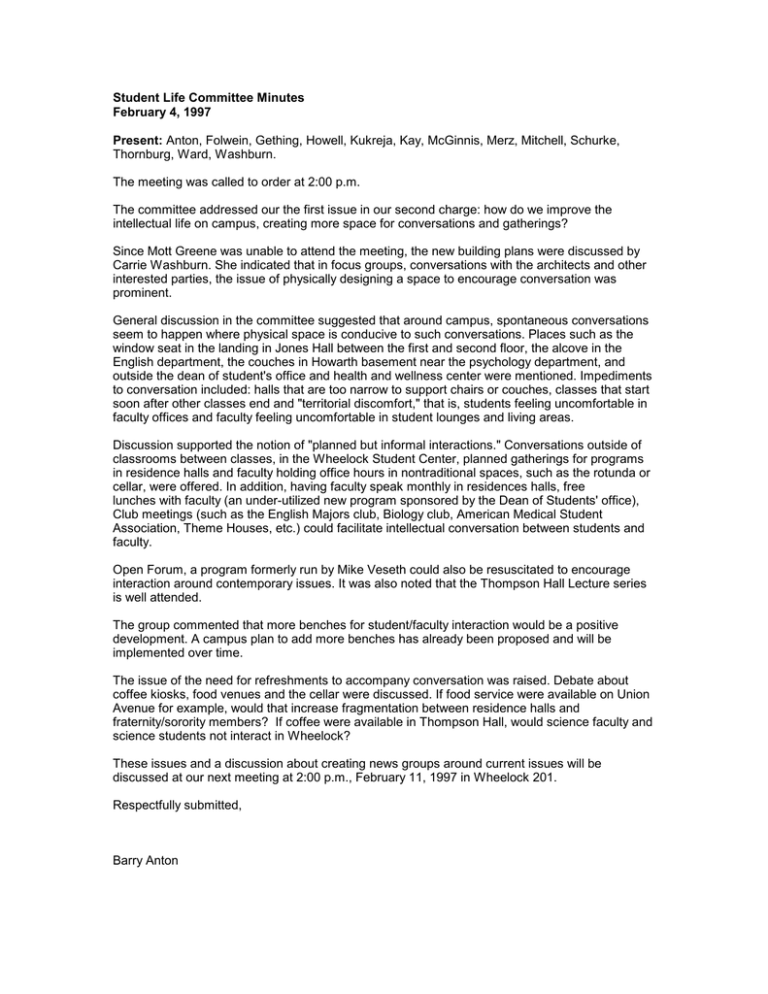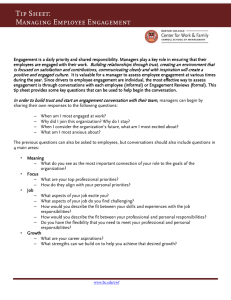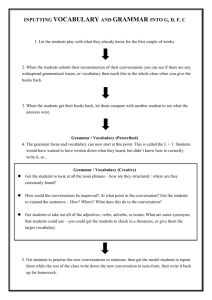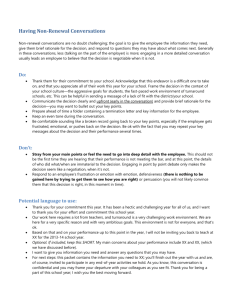Document 12262367
advertisement

Student Life Committee Minutes February 4, 1997 Present: Anton, Folwein, Gething, Howell, Kukreja, Kay, McGinnis, Merz, Mitchell, Schurke, Thornburg, Ward, Washburn. The meeting was called to order at 2:00 p.m. The committee addressed our the first issue in our second charge: how do we improve the intellectual life on campus, creating more space for conversations and gatherings? Since Mott Greene was unable to attend the meeting, the new building plans were discussed by Carrie Washburn. She indicated that in focus groups, conversations with the architects and other interested parties, the issue of physically designing a space to encourage conversation was prominent. General discussion in the committee suggested that around campus, spontaneous conversations seem to happen where physical space is conducive to such conversations. Places such as the window seat in the landing in Jones Hall between the first and second floor, the alcove in the English department, the couches in Howarth basement near the psychology department, and outside the dean of student's office and health and wellness center were mentioned. Impediments to conversation included: halls that are too narrow to support chairs or couches, classes that start soon after other classes end and "territorial discomfort," that is, students feeling uncomfortable in faculty offices and faculty feeling uncomfortable in student lounges and living areas. Discussion supported the notion of "planned but informal interactions." Conversations outside of classrooms between classes, in the Wheelock Student Center, planned gatherings for programs in residence halls and faculty holding office hours in nontraditional spaces, such as the rotunda or cellar, were offered. In addition, having faculty speak monthly in residences halls, free lunches with faculty (an under-utilized new program sponsored by the Dean of Students' office), Club meetings (such as the English Majors club, Biology club, American Medical Student Association, Theme Houses, etc.) could facilitate intellectual conversation between students and faculty. Open Forum, a program formerly run by Mike Veseth could also be resuscitated to encourage interaction around contemporary issues. It was also noted that the Thompson Hall Lecture series is well attended. The group commented that more benches for student/faculty interaction would be a positive development. A campus plan to add more benches has already been proposed and will be implemented over time. The issue of the need for refreshments to accompany conversation was raised. Debate about coffee kiosks, food venues and the cellar were discussed. If food service were available on Union Avenue for example, would that increase fragmentation between residence halls and fraternity/sorority members? If coffee were available in Thompson Hall, would science faculty and science students not interact in Wheelock? These issues and a discussion about creating news groups around current issues will be discussed at our next meeting at 2:00 p.m., February 11, 1997 in Wheelock 201. Respectfully submitted, Barry Anton




